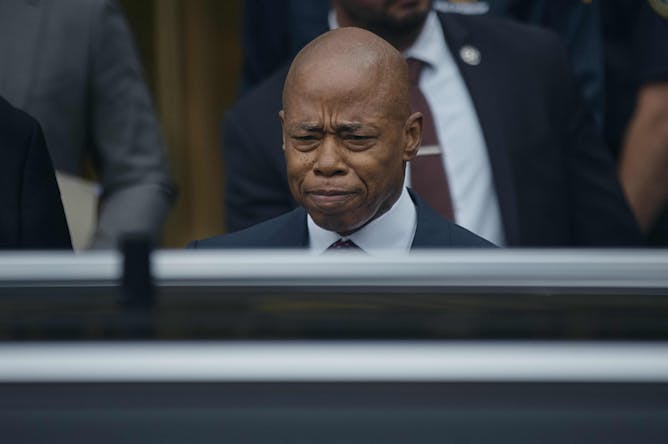|
|
|
|
The countdown to Election Day is on, and Americans across the country, but particularly in or near swing states, are seeing and hearing a seemingly endless barrage of election-related advertising. Some of those ads come from the campaigns, but there are other, hidden forces at work seeking to influence voters’ choices in November.
Emily Lau, at the University of Wisconsin-Madison’s State Democracy Research Initiative, explains the American political phenomenon known as “dark money” – funds spent on electioneering that come from unknown, and unknowable, sources.
She describes how this type of spending is legal and what can, and can’t, be known about where it comes from and where it goes before ending up in front of our eyeballs on TV and online. She also explains why, despite efforts to bring more transparency to this powerful force in American politics, not much is likely to change anytime soon.
Also in this week’s politics news:
|

|
Jeff Inglis
Politics + Society Editor
|
|

Where exactly did this money come from?
Manuel Augusto Moreno/Moment via Getty Images
Emily Lau, University of Wisconsin-Madison
Donors often try to conceal their involvement in politics, and campaigns try to hide what they spend their money on.
|

A picture of the secretary-general of Hezbollah Hassan Nasrallah is seen among the rubble following an Israeli air strike.
Str-/picture alliance via Getty Images
Mireille Rebeiz, Dickinson College
Israeli strikes have wiped out much of the leadership of a group that has huge influence – if not popularity – within Lebanon.
|

New York City Mayor Eric Adams leaves after appearing at the Daniel Patrick Moynihan Court House in New York on Friday, Sept. 27, 2024.
AP Photo/Andres Kudacki
Lincoln Mitchell, Columbia University
Eric Adams, the New York mayor facing an indictment that could end his career and send him to jail, long boasted that his swagger was good for the city. But swagger doesn’t make a good mayor.
|
|
|

Deyanira Nevárez Martínez, Michigan State University
The US Supreme Court’s high-profile Grants Pass ruling allows cities to clear homeless encampments, even if they can’t offer shelter. A scholar explains why a Housing First approach is more effective.
| |

Howard Manly, The Conversation
Beloved in his hometown of Plains, Georgia, Jimmy Carter became the 39th US president and used his office to make human rights a priority throughout the world.
|

Paul M. Collins Jr., UMass Amherst
A leading expert in the selection of federal judges analyzes the Trump and Harris records regarding judicial nominations. There’s a big difference in their approaches.
| |

Linda C. McClain, Boston University; Nicole Huberfeld, Boston University
While the Republican Party platform has typically included anti-abortion language, this year’s platform is curiously silent on the issue.
|
|
|
International
|
-
Javed Ali, University of Michigan
A US counterterrorism expert explains the dynamics between Israel, Iran, Hezbollah and Hamas – and why Hezbollah presents new risks for the US and other places globally.
-
Charles Walldorf, Wake Forest University
Washington has had little luck in its calls for de-escalation in the Middle East. Is America’s ‘ironclad’ support for Israel part of the problem?
-
Julia Khrebtan-Hörhager, Colorado State University
Russian President Vladimir Putin has increasingly turned to education and membership groups to promote patriotism and loyalty among the country’s youth.
-
Colin Flint, Utah State University
Russia is becoming more reliant on naval support from China, limiting Moscow’s sea-power reach.
|
|
US election
|
-
W. Joseph Campbell, American University School of Communication
Polls help set the public’s expectations in a presidential race. In 2020, presidential polls overall were the worst in 40 years. No misfire was more striking than CNN’s. Will CNN do better in 2024?
-
A. K. Sandoval-Strausz, Penn State
Allentown, Bethlehem and other old industrial cities in Pennsylvania have made a remarkable recovery − thanks in part to new residents from Puerto Rico and the Dominican Republic.
-
Rachel Rebouché, Temple University
Ahead of the election, a reproductive health law scholar lays out the broad strokes of what both Harris and Trump have done regarding abortion policy while in office.
-
Jennifer Watling Neal, Michigan State University; Zachary P. Neal, Michigan State University
Compared with voters who are trying to have kids or haven’t decided yet, those who definitely don’t want to have kids – known as the ‘child-free’ – have a different set of political priorities.
|
|
|
|
|
|
| |
| |
| |
| |
|
|
|
|
|
|
|